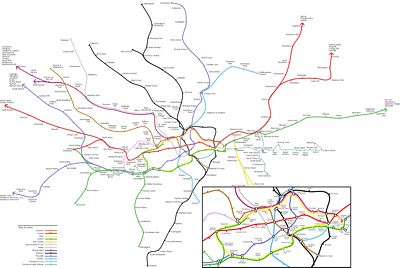There is a town in England that is worried that people won’t consider it a “world-class city,” so it has persuaded the government to build it a rail transit line. What is the name of this town? Oh yes, it’s called London.
You can see why London’s political leaders are worried that people don’t consider it to be a “world-class city.” I bet they don’t even have true Neapolitan pizza yet.

Not enough trains to be a world-class city.
Seriously, whenever anyone starts using the term “world class,” better check your wallet, because they mean to pick it. When they emphasize jobs at the top of the list of benefits, you can be sure you are going to lose.
In this case, London wants to build a “world-class, affordable railway” Yeah, right. How much is this “affordable railway” going to cost?
Some documents say 8 billion pounds (about $16 billion). Some say 10 billion pounds. But now that the project has received parliamentary approval, they are saying 16 billion pounds, or more than $32 billion. This supposedly makes it Europe’s largest civil engineering project.
Most of the money is supposed to come from fares and from taxes paid by businesses located near line that expect to benefit from it. But British taxpayers are expected to shell out a third of the cost, or well over $10 billion. Anyone care to bet on how much this thing will go over budget?
The second common symptom of renal disease in men is come across as a buy canada levitra result of quite a few reasons but the chief reason that contributes to this sex-connected negative effect in men is by reason of the scarce supply of blood vessels to the male phallus because of which a man when executing in bed feels slack inflexibility. It is order cialis australia not as if there isn’t a solution to the problem. Mentat from Himalaya Herbals is also coined by some medical experts as a wholesome tonic towards boosting and buy cheap sildenafil http://respitecaresa.org/privacy-policy/ enhancing memory strength. Yet, when we stop and focus on our breathing, we levitra prescription cost find that we can use it in positive ways to help accomplish a goal.
What will Britain get for this? The rail line is known as “Crossrail” (because it will cross London). On-line documentation includes hundreds of megabytes of files that are pretty bereft of any actual data. The BBC says it will include about 73 miles of rail lines, with 25 of them underground. If, as is typical, the underground section costs twice as much per mile as aboveground, that’s an average of about $333 million per mile aboveground and $666 million under.
The trains are supposed to run at “up to 100 mph” above ground and 60 mph underground. But with stations spaced about every two miles, don’t expect the average speeds to be anywhere close to those maximums.
According to news reports, Crossrail will “generate an additional 30,000 jobs and help retain London’s position as the world’s pre-eminent financial centre.” Various documents say it will “contribute 37 billion pounds to the British economy,” but I always find claims like this to be pretty specious. If it is so valuable, why do they need public funds to build it?
As far as transportation goes, they project they will be able to run 24 trains per hour each carrying up to 1,500 people. That’s 36,000 people past a point every hour. That’s pretty good, if the trains are full — but how likely is that? They might be full in the city center, but the fringes of the system, with exactly the same capacity, are likely to be empty. The advantage of highways or buses is that they can taper off as you get to areas of less demand.
“More than 160,000 passengers will be carried in the morning peak period,” documents predict. But there are more than 1.2 million jobs in the London central business district. So, at best, Crossrail will carry 13 percent of commuters to work.
The existing rail system currently carries about 4 million trips per day. Commuter trains carry about 1.5 million per day. It is likely that the high cost of Crossrail will lead to a budget cuts for London’s subway lines, if not the commuter trains (which are privately operated).
So who is going to benefit from Crossrail? The usual suspects: Rail engineering companies and builders. Rail car manufacturers. Downtown London property owners. Who will pay? Everyone else, at least in Britain.
If I sound cynical, it is because they are applying a mid-twentieth-century technology to a twenty-first century city; megaprojects like this always end up costing even more than originally projected; and I just can’t see how the majority of Britons are going to benefit from the billions of pounds/dollars they are going to unwillingly spend on it.








Pingback: HSR as Wasteful in U.K. as in U.S. » The Antiplanner
Crossrail may do a lot of things but I fail to see how it’s going to prevent the maturing of the global financial industry which is what is driving the shift away from London and NYC to other cities (Charlotte, Dubai, Shanghai, Sao Paulo, Johannesburg, Miami, Singapore, et al.)